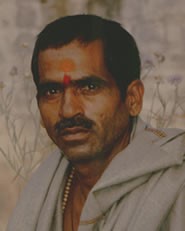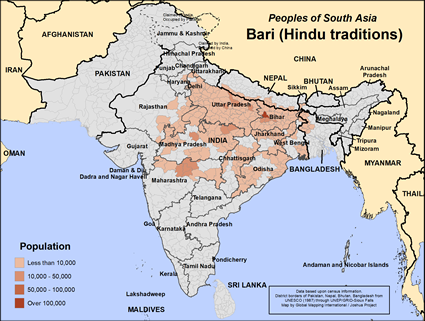Bari (Hindu traditions) in India

Photo Source:
Copyrighted © 2026
Create International All rights reserved. Used with permission |

Map Source:
People Group Location: Omid. Other geography / data: GMI. Map Design: Joshua Project
|
| People Name: | Bari (Hindu traditions) |
| Country: | India |
| 10/40 Window: | Yes |
| Population: | 641,000 |
| World Population: | 650,800 |
| Primary Language: | Hindi |
| Primary Religion: | Hinduism |
| Christian Adherents: | 0.01 % |
| Evangelicals: | 0.00 % |
| Scripture: | Complete Bible |
| Ministry Resources: | Yes |
| Jesus Film: | Yes |
| Audio Recordings: | Yes |
| People Cluster: | South Asia Hindu - other |
| Affinity Bloc: | South Asian Peoples |
| Progress Level: |
|
Introduction / History
Bari of India are also called Rawat and Paanwale. In Bihar they are also called Donwar.
The Bari speak Awadhi in Uttar Pradesh, Marathi in Maharashtra, Bhojpuri in Bihar and Mewari in Rajasthan. They speak Hindi also in these states and read and write in Devanagari. Literacy is low, Maharashtra being the exception.
What Are Their Lives Like?
Bari women help by taking additional work or helping their spouses with their businesses as well as doing the housework and looking after the children. In the west of Maharashtra, most are growers of betel leaves. In Rajasthan they catch birds in the forest, make leaf plates and cups, reed seats, paper flowers and cages from wire. In Bihar they carry electric and gas lights at weddings. Most own no land but work in agriculture. Many have small businesses such as pulling people in rickshaws, cart driving and tailoring. They live in city slums. Child labor is an issue in this culture.
Bari people do not eat beef because of their Hindu religion. They eat wheat, rice and lentils, fruit and vegetables. They drink alcohol, smoke cigarettes and chew tobacco. They use local medicines however clinics are used for more serious matters.
Bari only marry within their community. There are many subdivisions. There are clans among them who look after marriage alliances. No one is allowed to marry within their clan. Marriages are mainly monogamous and are arranged by the elders of both families. There are both adult and child marriages. Divorce and remarriage are allowed, but not frequent.
The property of the parents goes equally to all the sons and the oldest son becomes the family leader. The Bari community has their own welfare associations.
What Are Their Beliefs?
The Bari are Hindus and worship most of the Hindu gods like Shiva, Vishnu and Rama. They also worship family and village gods and worship ancestors too. They celebrate Hindu festivals such as Holi, Diwali and Dusshera.
They also celebrate a New Year festival called Makar Sankranti and here sesame seeds combined with jaggery (unrefined sugar) are exchanged among the Bari. They cremate their dead and the ashes are immersed in a river. If they can, they use the River Ganges, which is regarded as holy. Infants to the age of five years old are buried and there is a death pollution period, usually for twelve days with a feast at the end of it.
What Are Their Needs?
There are few if any Christ followers among the Bari people, so they need outsiders to take Christ to them. Who will go?
Prayer Points
Pray for loving workers to take the gospel message to the Bari community in India.
Pray the Lord will prepare the hearts of the Bari to understand and to believe the gospel.
Pray for the Lord to bless the Bari people with adequate education and medical facilities.
Pray for the Lord to bless the Bari people so abundantly that they will see he is the only one worthy of praise and worship.